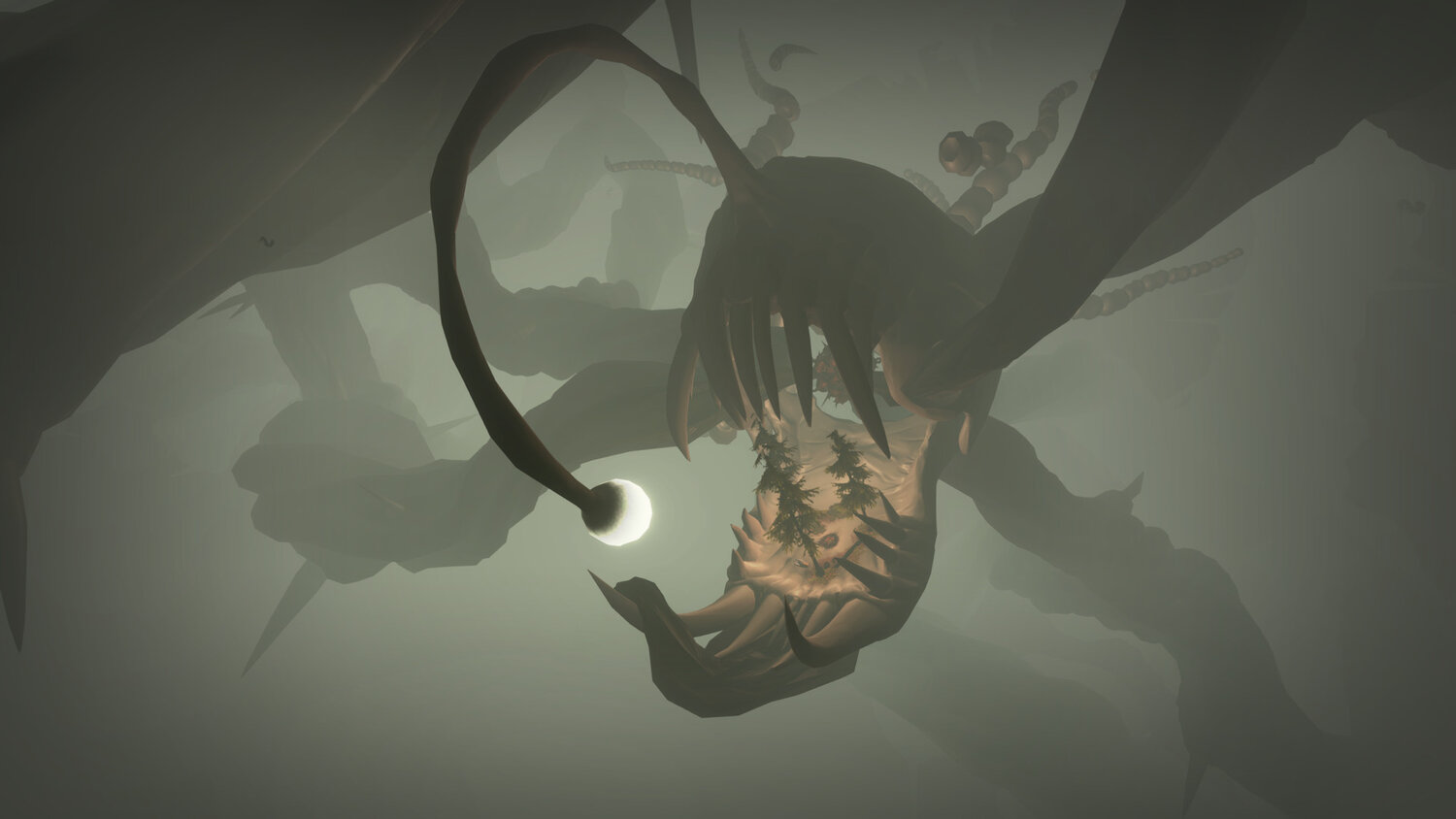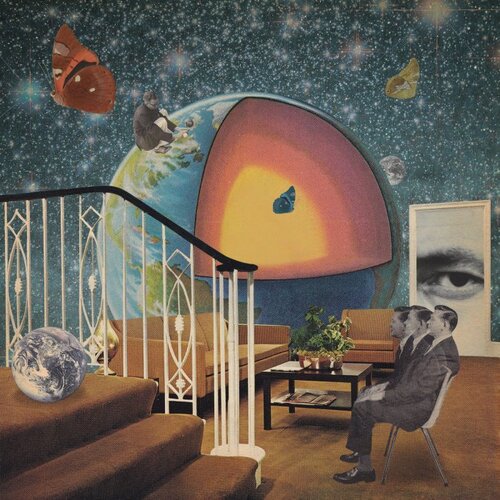Outer Wilds and Millenial Dread
Playing Outer Wilds prompted a mental reaction I have never had before.
Somewhere in the space between planets, as I sought out the clues to solve this rapidly decaying universe, I found the answer to a question I never asked.
I have as much trouble describing the mental distress Outer Wilds caused as I do just describing the game itself. There is nothing quite like the first reveal, the slow burn of you realizing what it means, all followed by the slow and meticulous uncovering of hints and clues. It all plays out like this very intimate mystery, despite its clear implications for the universe the game takes place in.
I remember the first time I saw my uncle play Metal Gear Solid and fight Psycho Mantis. I often think about the implications that a game could encourage the player to do something physical, in the real world, to interact with it. I am even often disappointed by the fact that very few games actually prompt such interactions.
Outer Wilds never asks you to do something in the physical world to complete it. Nothing I saw. But what I did encounter was a strange and deep urge to disengage with the game entirely.
The impending doom of Outer Wilds, and its 22 minute time-loops, triggered a particularly millennial, frighteningly familiar fear: You will never have enough time to get to everything done that needs to be done. Every time a new loop starts, you head into your ship and read through your discoveries from the last loop. As the game progresses, each time you repeat this process the questions become more vague at the same time they become more precise. Putting together the mystery you are tasked with solving does not, innately make the game less obtuse. In fact, there are several moments where learning something scrambles the assumptions you previously had, leaving you staring at a bowl of plot spaghetti rather than the network of info highways you thought you had. It is through this process of misdirection and partial learning the game gets you to keep saying, “one more loop.”
However, there was a moment about twenty hours into my playthrough, when I realized I had never ventured to Giant’s Deep. Here I was hours and hours into trying to solve this mystery, and I had left an entire fucking planet out of the equation.
I remember sitting in my office, staring at the screen thinking, “But, I felt so close…”, and then turning my xbox off. I didn’t return for an entire week. It was crippling.
When I came back, aside from kicking myself for such a strange lapse in memory, I began to panic. I scrambled to Giant’s Deep hoping to earn some kind of reward for showing up and found absolutely nothing. Of course, the result I should have expected. Outer Wilds is adept at making players take their time, despite their being a constant invisible timer. You will want to rush while playing this game. Don’t. The music denoting the end of the loop began to play, I stared at a room I couldn’t access, realized how to get there in the same moment I realized my time had run out, and I just waited for the supernova to wash over me.
It was this strange battle I fought with myself over time which led to a lot of my stresses playing Outer Wilds. Each new loop, I wanted to break through in some way, find another clue, discover something new. The strange and cryptic messages left behind by the Nomai would feed me just enough information. Without failure, the loop would end just as I realized something else and I would have to wait for time the pass in the next loop for the conditions to be just right to access the info my revelation 22 minutes earlier had clued me in to.
All of this led to a vicious love/hate relationship with the title. I loved finding clues and I despised running out of time. I loved the feeling of discovery and hated the overwhelming feelingI would never have enough time to discover it all.
Then I got to the end.
This entire game was offset, oddly enough, by the release of an album I latched onto in a way I have never experienced. Thank You Scientist’s album Terraformer came out on June 14th, a little over two weeks after Outer Wilds’ release and almost exactly when I found the time to start playing. The album is incredible, which I realize is subjective, but I couldn’t help but hear the songs as I thought of the game. Track Everyday Ghosts breaks into a chorus which says, “Sometimes I feel so ordinary / Sometimes I struggle with who I am.” I felt this in most every moment of Outer Wilds. I felt overwhelmingly normal, tasked with solving a mystery so far beyond me.
The album rests firmly in the Progressive genre, and I found a great deal of pleasure figuring out when and how the many time changes would play out. Without going into laborious detail on the album’s lyrical choices, suffice it to say I felt the words of each song spoke on some level to a facet of the game. No song better than Geronimo, a track devoted to helping its listener learn the best way through life is to understand there are some things that are just outside of your control. The end of Outer Wilds drove this home tenfold.
When you finally piece together the final parts of the mystery Outer Wilds sends you on one last trip. And boy is it a trip. As I pieced together the last moments of the game I was hit by this unavoidable wave of relief, accomplishment, and oddly enough, reassurance. The game is full of heartbreaking discoveries. As you traverse the solar system you encounter the remains of Nomai scientists who have been trying to solve the same mystery as you, and who have obviously failed. You see their jubilant cheers when they make a breakthrough. You see their somber replies when they hit walls.
But then you figure it out.
I found myself trekking the pine needled earth of a forest, a single light source ahead of me, and infinite night sky overhead. The stars tumbling in the infinite black. As I followed the prompts I found instruments playing in the dark. I brought them back to the fire. As I brought each instrument back, their musician would appear, sitting around the crackling wood and flickering light. I assembled them all and then went to speak to them. “Should I start playing?” They would each ask this question. One by one I said yes and each instrument began to hum, strum, and drum. Each added a stream of smoke above the fire pit. When I went to speak to each of the players again they said something I’m not quite sure I was ready for.
“Even if it’s over now, I had a great time learning.”
“The past is past, now, but that’s…you know, that’s ok! It’s never really got completely. The future is always built on the past, even if we don’t get to see it.”
“I tell you what, this has been really fun. And I got to help make something pretty cool, so I’ve got no complaints.”
Each statement an admission that, “I didn’t get everything done, but that’s ok!” It was a prescription to a sickness I didn’t want to admit I had. All of this fear I would never have time to get it all done began to wash away. I saw the face of my grandfather, smiling, happy that, while his chapter was over, he was given the opportunity to play a part. All at once I was made to realize, it’s not about doing it all in one go. It’s about playing your part to the best of your ability, lending to the next crescendo, contributing to the confluence.
As I internalized this I stepped into the smoke above the fire, detonated existence, and set the ground work for a new universe to come. The futility of my endeavor to stop the end of existence was replaced by the satisfaction that some things simply must happen, and it is our responsibility to make sure when they do, even before they do, we just do our best.
All the time I spent with this game was fraught with tension and trepidation until I knew what I was meant to do; A lesson with surprising connections to one’s journey through life. One which hopes to help you find pleasure in trying to figure it all out.
~Caleb
@LubWub






